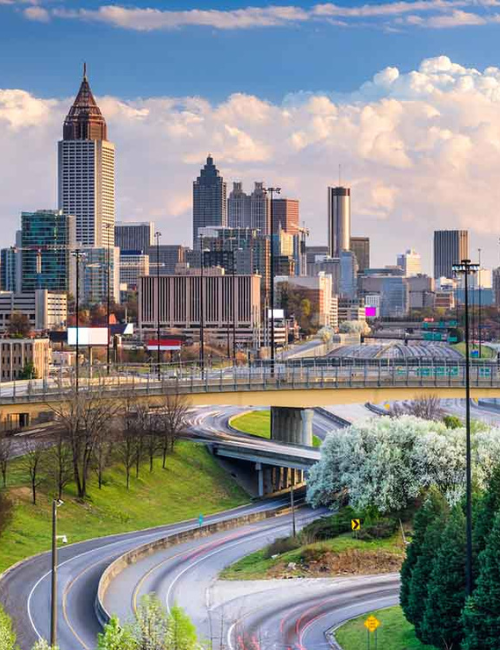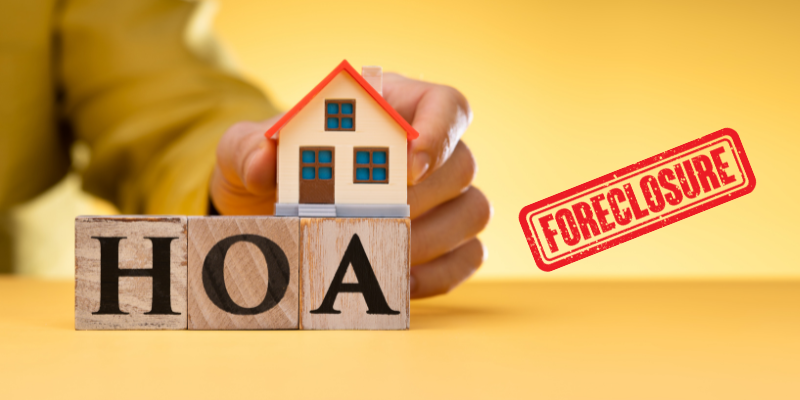
Many homeowners in Georgia don’t realize how much authority homeowners’ associations (HOAs) have. For example, they can foreclose on a property if dues are not paid. That concept is scary for families who are having trouble with money. Anyone who owns or plans to buy a house in a HOA neighborhood in Georgia needs to know how HOA foreclosures work. This article explains the rules that govern HOA foreclosures, answers frequently asked questions, and gives useful advice on how to safeguard your property and your rights.
Key Highlights
- It’s important to know how the process works because Georgia HOAs can take properties away if the dues aren’t paid.
- Judicial foreclosures take longer, but they allow homeowners a chance to fight the case or settle it before they lose their home.
- Georgia’s HOA system depends a lot on contracts and community covenants, which lets organizations run their neighborhoods in a way that works for them.
- Good communication and getting legal help early can frequently stop a foreclosure before it starts.
- HOA liens are legal claims that let owners know about late payments. Owners should take them seriously before they get worse.
What You Need to Know About HOA Foreclosure in Georgia
HOA foreclosures in Georgia are a strange blend of contract law, community bylaws, and state laws. Homeowners’ associations do more than just make sure everyone follows the laws about their lawns and plans neighborhood events. They also manage the money that keeps communal spaces clean. When homeowners don’t pay their dues on time, the HOA might exercise its legal right to collect, often by foreclosing on the property.
What is a HOA and what do they do?
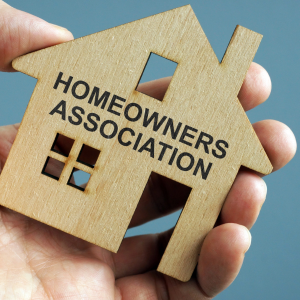
A homeowners association (HOA) is a legal group that a property developer sets up to run a neighborhood. In Georgia, homeowners’ associations (HOAs) take care of both the business and social aspects of living in a community. They keep up shared areas like parks, pools, and clubhouses, and they also make sure that everyone follows the regulations in the neighborhood. Every homeowner who buys property in the community signs a purchase agreement that includes these guidelines, which are in the community’s bylaws and covenants.
The main job of the HOA is to maintain property values high and the area looking nice and working well. Every homeowner pays dues that go toward upkeep and maintenance to pay for this. If someone doesn’t pay, the HOA may charge late fees, add interest, or even put a lien on the property. A lien is a legal notice that the owner owes money. It can stop the sale or refinancing of the home until the debt is paid off.
The HOA can take more steps if the debt isn’t paid, such as foreclosing on the property. It may sound excessive, but the idea is that one homeowner’s failure to pay can hurt the budget of the whole community. Georgia law still says that HOAs must complete certain legal steps before they can foreclose. They have to write to the homeowner and give them time to fix the problem, either by paying the debt or making a payment plan.
Open communication often prevents problems from escalating. Homeowners and investor home buyers in Georgia who stay engaged with their HOA by attending meetings, asking questions, and keeping track of their accounts are far less likely to face serious issues or risk losing their properties. At its best, an HOA isn’t about punishing members; it’s about fostering a healthy, stable community by working collaboratively with both homeowners and investors to maintain balance and protect neighborhood value.
How to Get Through the Foreclosure Process in Georgia
Homeowners can stay calm and deal with problems better if they know how HOA foreclosures work in Georgia. HOA foreclosures in Georgia follow a set legal process, just like regular mortgage foreclosures. The HOA normally starts the process by putting a lien on the property for unpaid dues.
Georgia has two primary forms of foreclosures: judicial and non-judicial. Banks commonly utilize non-judicial foreclosures because they are faster, whereas HOAs usually have to go through the court system. That means they go to court and file a lawsuit, giving the homeowner a chance to answer.
If the court agrees with the HOA, it might allow a foreclosure sale, which is when the property is sold at auction to pay off the debt. But homeowners still have ways to stop this from happening. The owner can typically “redeem” the property by paying the overdue sum, which includes fees and expenses, before the sale is official.
Even though the court process is difficult, it offers homeowners a lot of time to find a solution. Getting a lawyer early might help you work out a payment plan or fight back against the HOA’s unfair acts. Homeowners should also keep thorough records of payments, notices, and letters, since these might be very important in court.
Being proactive is the key. Dealing with payment problems as soon as they come up, reading the HOA bylaws to learn the requirements, and keeping in touch with the association may all make a big impact. Georgia law gives HOAs a lot of power, but homeowners also have rights. Knowing these rights might help you avoid a bad situation from getting worse.
How Georgia HOA Rules Affect Homeowners
HOA rules in Georgia have a big impact on how people live their daily lives. They explain how HOAs are set up, how they work, and what rights the homeowners and the association have. Georgia offers HOAs a lot of freedom compared to other states, but it also protects homeowners legally.
What makes Georgia HOA laws different from those in other states
Georgia’s HOAs are a little different from those in most other states. Georgia doesn’t rely on a lot of governmental rules. Instead, it relies on covenants and ordinances that are specific to each community. This means that the rules for each HOA can be very different from one another.
That flexibility lets communities adopt rules that work for them, but it also means that homeowners need to be careful about what they sign. Some states have severe laws that limit what HOAs can accomplish. Georgia’s HOA rules are very important legally, thus it’s important for residents to know what their community’s rules are.
Georgia is different in that it requires HOA foreclosures to go via the court system. This makes the procedure longer and more expensive, but it also makes sure that it is fair. Homeowners can fight the foreclosure, work up a repayment plan, or take their case to court. These protections aren’t always accessible in other places.
This approach is flexible but still legally binding, so it’s important for everyone to take part. Homeowners should go to meetings, vote on important topics, and look over any changes to the rules of the community that are suggested. Being involved helps make sure that decisions are made that are good for everyone, not just a few board members.
Important Parts of Georgia HOA Rules
The guidelines for Georgia’s HOAs stress three primary ideas: openness, fairness, and getting homeowners involved. Before putting liens on a property or commencing a foreclosure, associations must send property owners a letter letting them know. This gives them time to fix the problem. These notifications aren’t just for show; they’re chances to talk and work things out.
In Georgia, every HOA has its own set of rules and regulations, which are typically dubbed CC&Rs (Covenants, Conditions, and Restrictions). These spell out how to pay, what the community standards are, and how to enforce them. Homeowners should preserve copies of these because they are different in each community and look at them often.
Georgia law also says that HOAs must be honest. They have to have meetings that are open to the public, write down their decisions, and keep records that are easy to find. This makes sure that homeowners can speak up and hold their HOA responsible.
Another protection in Georgia’s system is that homeowners can appeal decisions they think are unfair. Owners can use this method to make sure their concerns are addressed, whether they are fighting a fee, a lien, or an alleged violation.
The main goal of Georgia’s HOA rules is to find a balance between power and responsibility. Homeowners may defend their property rights and assist keep the neighborhood prospering and working together by learning the regulations and being involved in community affairs.
Reasons Why HOAs Foreclose
It doesn’t happen overnight that a HOA forecloses. They frequently happen because of money problems, problems with communication, or not understanding who is responsible for what. The two main reasons for this in Georgia are unpaid HOA dues and liens imposed by the association.
HOA Dues and Other Financial Obligations
If you buy a house in a HOA neighborhood, you agree to help pay for the upkeep of shared spaces and community buildings. These contributions, which are your HOA dues, help the neighborhood run smoothly. When these dues aren’t paid, the whole community feels the effects, and the association has to pay for things with less money.
If dues are late for too long, the HOA may first send warnings and late fees, and then they may file a lien. If you don’t pay your bills on time, you could end up in foreclosure.
For homeowners who are having trouble with money, talking is the best thing to do. Get in touch with the HOA as soon as possible and tell them what’s going on. Many organizations are willing to work with homeowners on payment plans or temporary relief options, especially if the homeowners are making an attempt to pay off their debt. On the other side, ignoring alerts almost always makes things worse.
It’s also smart to stay informed about how your HOA manages its finances and sets dues. Understanding where your money goes builds trust and accountability. And if your financial situation becomes too overwhelming, exploring options to sell your house fast in Savannah can provide the fresh start you need.
What HOA liens do in foreclosures
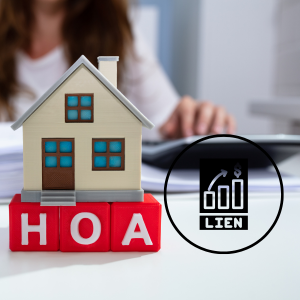
The first official step before foreclosure is a HOA lien. If a homeowner doesn’t pay their dues, the association can put a lien on the property in the county’s public records. This is both a warning and a legal claim against the property.
A lien might stop you from refinancing or selling your house until the loan is paid off, which is a strong reason to act promptly. It’s a severe step, but it also gives homeowners an opportunity to solve the problem before it becomes worse and leads to foreclosure.
Homeowners should get in touch with the lienholder as away to work out a deal. The sooner you start talking, the more alternatives you have, like setting up a payment plan or fighting wrong charges.
Liens aren’t just about punishing people; they’re also about keeping the community’s finances in order. People who own homes may often save a small problem from becoming a big one by taking it seriously and acting immediately.
Avoiding Foreclosures by Associations
The best approach to deal with a HOA foreclosure is to stop it from ever happening. That means Georgia homeowners need to be proactive, be organized, and keep in touch with each other.
How to Talk to Your HOA Effectively
The best thing homeowners can do is talk to one other clearly. You can stay up to speed by going to meetings, reading newsletters, and checking the HOA’s website or community board. The less you know, the more shocks you’ll have.
Get in touch with the HOA right once if you know you won’t be able to pay your dues. A lot of boards are eager to work with residents who are honest about their problems. It’s much better to talk about payment plans or partial payments than to let unpaid bills pile up without saying anything.
Before pursuing legal action, HOAs are obligated by law to let owners know. Please take those notices carefully and respond right away. If you don’t agree with a fee or think you’ve been charged too much, ask for an explanation in writing. Keeping the interaction professional and on paper is good for both sides.
Good communication fosters trust and understanding, which helps save modest money problems from becoming into foreclosures.
Things to do to avoid foreclosure
There are a lot of helpful tools available to homeowners in Georgia. You can get advice from legal aid groups, housing counselors, and financial consultants to understand your rights and make a plan to catch up on your payments.
For example, HUD-approved housing counselors can give you free or low-cost assistance on how to make a budget, deal with debt, and avoid foreclosure. These professionals can assist you talk to your HOA or look into financial possibilities.
It’s also necessary to get legal help. A lawyer who knows Georgia HOA regulations can clarify your choices, stand up for you in talks, or assist you fight an unfair lien or foreclosure filing. Some counties also have free legal clinics or community mediation programs that help homeowners who need it.
Finally, your HOA can be a helpful resource. Many associations hold workshops or classes on money management to keep residents up to date and in good standing. If you want to secure your home, the first step is to understand how things function. Don’t be afraid to ask questions.
Help and advice with the law
If you’re having difficulties with money and your home is in danger, it’s important to know your legal rights. Georgia’s foreclosure laws may seem complicated, but with the appropriate help, you can figure them out.
How to Know the Foreclosure Laws in Georgia
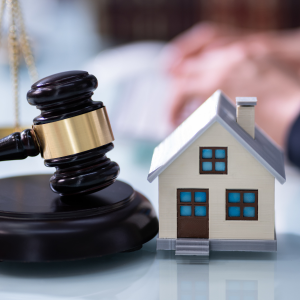
When collecting overdue dues, HOAs in Georgia must follow the court foreclosure process. This means they have to go to court, and homeowners have the right to defend themselves. A lien is usually the first step in the process. If the obligation is still not paid, it goes to court.
Because of this, you should act fast when you get a notice or a lawsuit. Getting a lawyer involved early on can help you negotiate and keep your home. Lawyers can fight the foreclosure, aid prove that payments were made incorrectly, or come up with new arrangements for paying back the loan.
Sometimes, they can also help with bankruptcy options, which can suspend foreclosure proceedings for a short period and give you time to reorganize your debts.
Homeowners in Georgia can get help understanding these choices and finding cheap legal advice from legal aid services, charitable groups, and housing counselors.
The most important thing to remember? Don’t put it off. The sooner you ask for help, the more ways you’ll have to keep your house safe.
In Georgia, homeowners’ associations (HOAs) can legally foreclose on homes for unpaid dues—but homeowners still have rights and options. By understanding the rules, staying in communication, and seeking help early, you may be able to prevent foreclosure and keep your home. It’s important to stay informed, attend HOA meetings, and ask questions to avoid misunderstandings. When challenges arise, don’t wait—get professional help right away, because waiting only makes things worse.
If you find yourself in a difficult situation or facing possible foreclosure, remember that solutions exist. Yellow Card Properties buys houses for cash in any situation, providing homeowners with a fast, stress-free way to move forward. Taking action early can help protect your home, your finances, and your peace of mind—so call us today to learn more about your options.
FAQs
What rights do Georgia HOAs have when it comes to foreclosure?
In Georgia, homeowners associations (HOAs) can foreclose on homes for unpaid dues. This is usually done through judicial foreclosure, which lets homeowners challenge the process in court.
What does a judicial foreclosure mean for a Georgia HOA?
The HOA takes the homeowner to court, where they can either answer or pay off the debt before the property is sold.
What can homeowners do to stop their HOA from foreclosing?
Keep in touch with your HOA, know what you owe, and get legal or financial help as soon as you run into problems.
In Georgia, what part do HOA liens play in the process of foreclosure?
A lien from a HOA is a legal demand for money that hasn’t been paid. It is registered in public records and must be paid off before you can sell or refinance your home.
What makes Georgia’s HOA foreclosure process different from those in other states?
Judicial foreclosures are required for HOAs in Georgia. This gives homeowners additional time and legal tools to fix problems before they lose their homes.
Helpful Georgia Blog Articles
- Navigating House Sales Before Divorce In Georgia
- Maximize Your Profit: Selling A House As-is In Georgia
- Effective Strategies For Selling A Hoarder House In Georgia
- How To Successfully Sell Your Home During Foreclosure In Georgia
- Strategies For Selling A House With Code Violations In Georgia
- How to Sell Your House Rent-to-Own in Georgia
- Capital Gains Tax After Selling a House in Georgia
- Can I Switch Real Estate Agents in Georgia?
- How To Sell A Condemned House in Georgia
- Can An HOA Foreclose On A House in Georgia
- For Sale By Owner Buyers Agent Commission in GA
- Can You Live In A House During Probate in GA
- Taxes When Selling An Inherited House in GA
